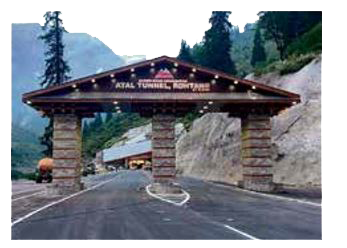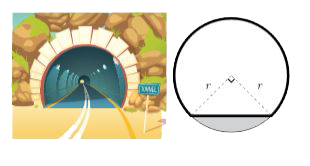Atal Tunnel (also known as Rohtang Tunnel) is a highway tunnel built under the Rohtang Pass in the eastern Pir Panjal range of the Himalayas on the Leh-Manali Highway in Himachal Pradesh, India. At a length of 9.02 km, it is the longest tunnel above 10,000 feet (3,048 m) in the world and is named after former Prime Minister of India, Atal Bihari Vajpayee. The tunnel reduces the travel time and overall distance between Manali and Keylong on the way to Leh. Moreover, the tunnel bypasses most of the sites that were prone to road blockades, avalanches, and traffic snarls.

Earth is excavated to make a railway tunnel. The tunnel is a cylinder of radius 7 m and length 450 m. A level surface is laid inside the tunnel to carry the railway lines. The Diagram 1 shows the circular cross - section of the tunnel. The level surface is represented by AB, the centre of the circle is O and ∠AOB=90∘. The space below AB is filled with rubble (debris from the demolition buildings).

Steel girders are erected above the tracks to strengthen the tunnel. Some of these are shown in Diagram 2. The girders are erected at 6 m intervals along the length of the tunnel, with one at each end.
On the basis of the above information, answer any four of the following questions:
How much volume of debris is required to fill the ground surface of tunnel ?
A
3500m3
B
14000m3
C
7000m3
D
10500m3
Text Solution
The correct Answer is:C
Cross-section area of debris part of tunnel
= Area of OACB - Area of ΔOAB
=πr24−r22=227×7×74−7×72=11×72−7×72
=4×72=14m2
Volume of debris required =14×500=7000m3
|
Topper's Solved these Questions
Similar Questions
Knowledge Check
Which of the following is the longest railway tunnel ?
ASt. Gothard (Switzerland)BEast Finchley (London)CCascade USADTanna (Japan)Select the most appropriate option to improve the underlined segment in the given sentence. If there is no need to improve it, select "No improvement".
The train pass over the long dark tunnel.Apasses intoBpass acrossCno improvementDpassed throughThe largest tunnel (Jawahar 'Tunnel) in India is located
AHimachal PradeshBRajasthanCWest BengalDJ&K
Which is the longest railway tunnel in lndi.a?
View SolutionA train 800 metres long is running at the speed of 78 kmph. If it crosses a tunnel in 1 minutes, then the length of the tunnel (in meter) is :
View SolutionTunnel vision is caused by
View SolutionThe largest tunnel (Jawahar Tunnel) in India is located in
View SolutionA train 700 m long is running at the speed of 72 km/h. If it crosses a tunnel in 1 min, then the length of the tunnel (in m) is
View Solution
